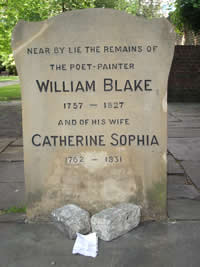Gordon Brown called on ‘the great poet William Blake’ to support his campaign, as noted in an earlier post. Not to be outdone, the other contenders have brandished their poetic sensitivities on the National Poetry Day site. It looks as if this could be a coalition squabble, since Lib-Dem leader Nick Clegg also wants to lay claim to Blake, citing ‘Eternity’: ‘it’s a fantastic way of saying “seize the day” and the perfect poem to read in times of trouble, really uplifting.’ It’s time to ‘seize the day’ yourself, Nick!
David Cameron chose Wilfred Owen: ‘I still remember the first time I read his poems and the incredible power and anger about the First World War. For me, they were literally an eye-opener.’ Literally, David? Were you normally asleep during poetry lessons at Eton? I can feel a Lear moment coming on:
Get thee glass eyes;
And, like a scurvy politician, seem
To see the things thou dost not.
This politician can hear Owen’s anger about about the First World War but is still happy to press ahead with buying Trident nuclear submarines, I recall. Alexander Pope in Rape of the Lock actually preferred a good drink, his politicians only pretend to be blind:
Coffee, which makes the politician wise
And see through all things with his half-shut eyes
Can we have both rhyme and reason at election time? See and hear Danny Chivers’ lively ‘Election Day’ poem here (and on YouTube) and decide where you’ll cast your vote!


 The
The